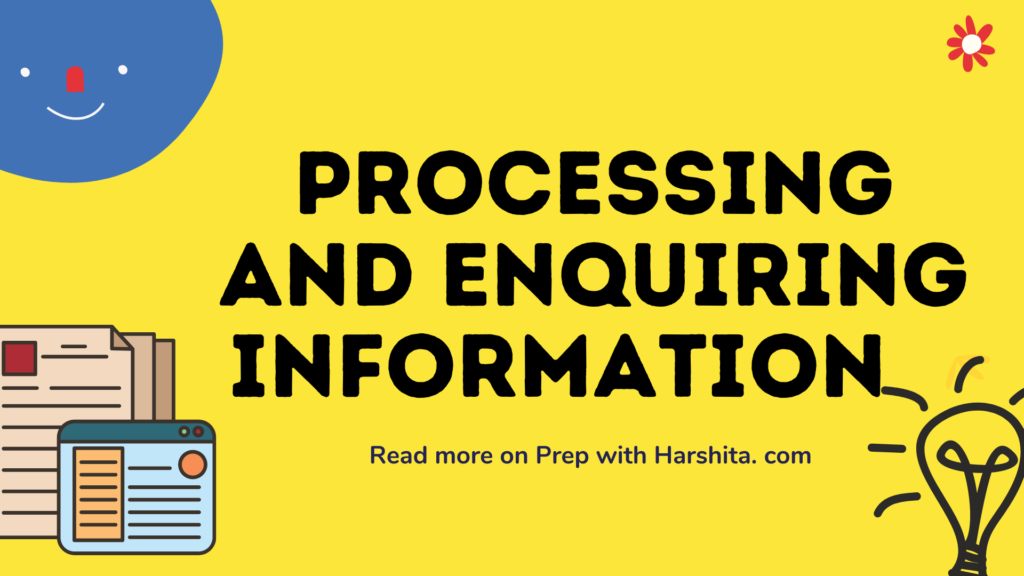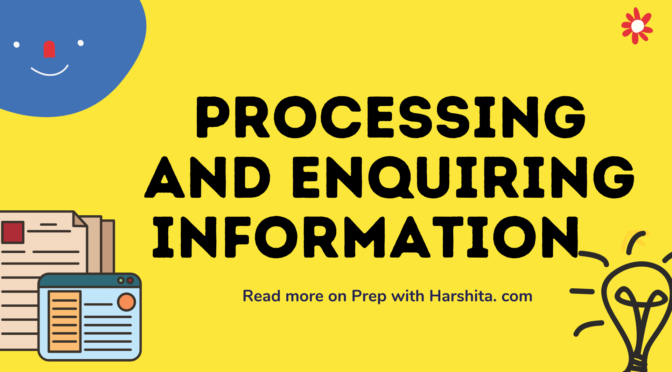Processing and enquiring information involves the cognitive processes of gathering, analyzing, and questioning information to deepen understanding, make connections, and develop critical thinking skills. It is a vital skill set for effective learning, problem-solving, and decision-making. Here are some key aspects of processing and inquiring information:
- Gathering Information: The first step in processing and inquiring information is gathering relevant and reliable information from various sources. This may involve reading books, articles, or online resources, conducting research, or collecting data through experiments or surveys. Students need to develop skills in locating, selecting, and evaluating sources to ensure the accuracy and credibility of the information they acquire.
- Analyzing Information: Once information is gathered, the next step is to analyze and organize it. This involves breaking down complex information into manageable parts, identifying key concepts, and determining relationships between different pieces of information. Analyzing information helps students extract meaning, identify patterns, and draw conclusions based on evidence.
- Questioning: Questioning is a fundamental component of inquiry-based learning. It involves asking thought-provoking and purposeful questions to explore the topic further, challenge assumptions, and uncover deeper insights. Effective questioning encourages critical thinking, stimulates curiosity, and drives the inquiry process forward. Students should be encouraged to ask open-ended questions, probe for more information, and consider alternative perspectives.
- Making Connections: Processing and inquiring information involve making connections between new information and prior knowledge. Students should seek to link new concepts and ideas with their existing knowledge and experiences. Making connections helps students construct meaning, see the relevance of information, and develop a coherent understanding of the topic. They can identify similarities, differences, cause-effect relationships, and apply their knowledge to real-world situations.
- Evaluating Information: Critical evaluation of information is crucial to ensure its validity and reliability. Students should develop skills to assess the credibility of sources, examine biases, detect misinformation or propaganda, and critically analyze arguments or claims. By evaluating information, students become discerning consumers of knowledge and develop a critical mindset.
- Synthesizing and Communicating Findings: Processing and inquiring information culminate in synthesizing the gathered knowledge and communicating findings effectively. Students should be able to synthesize and integrate information, organize their thoughts, and present their findings in a clear and coherent manner. This may involve creating reports, presentations, or other forms of communication that effectively convey their understanding and insights to others.
- Reflecting and Iterating: As students engage in the process of processing and inquiring information, it is important to encourage reflection on their learning journey. Students should reflect on their thinking processes, evaluate the effectiveness of their strategies, and identify areas for improvement. They can refine their inquiry skills, adjust their approaches, and engage in iterative cycles of processing and inquiring information.
Developing strong processing and inquiry skills empowers students to become active learners, critical thinkers, and lifelong seekers of knowledge. By honing these skills, students can navigate the vast amount of information available, think critically about complex issues, and develop a deep understanding of various subjects. These skills are invaluable in academic settings, professional environments, and everyday life.
Also Read : General Classroom Language

Also Visit : Prep with Harshita


18 thoughts on “Processing and Enquiring Information”